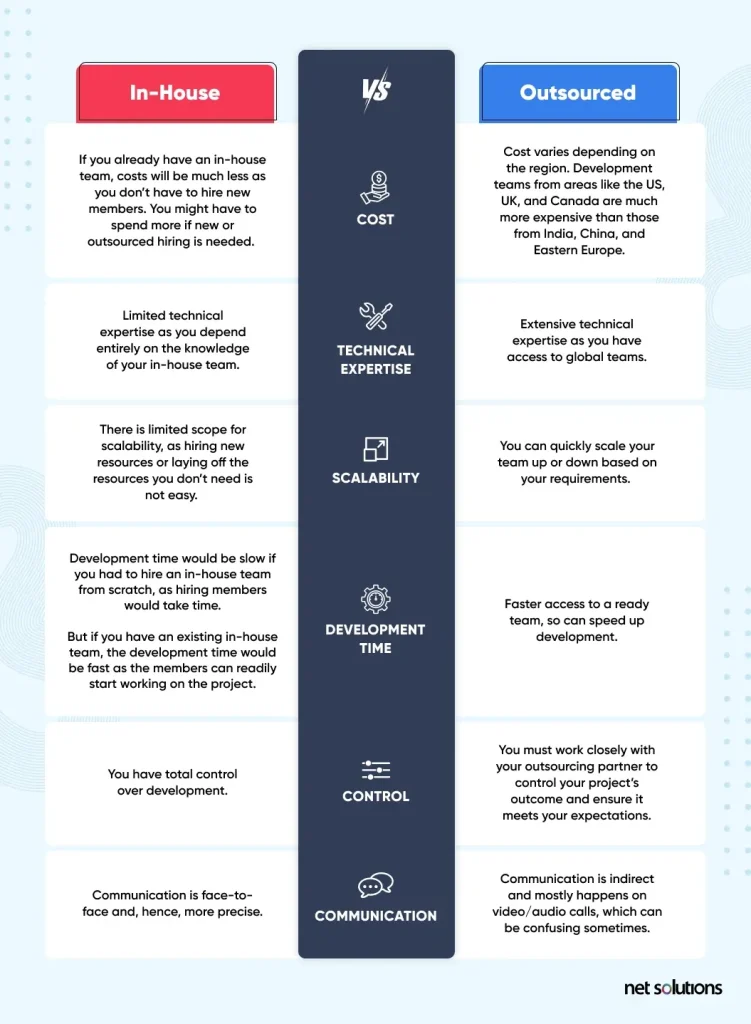Should I expand my in-house team or outsource some of my work to a third party? If you find yourself asking this question often, you’re not alone.
In-house and outsourcing are two prominent software development approaches. Both have their pros and cons. It is often difficult for decision-makers to decide among them because many factors, such as cost, timeline, quality, control, and project complexity, may influence your decision.
To help you make an informed decision, we’ve compared both approaches in this blog. Let’s begin:
The Difference between Outsourcing and In-house Software Development
Outsourcing is a software development approach in which you hire third-party service providers to work on your project. A suitable example of outsourcing is a bank hiring a software development agency to develop a banking app.
On the other hand, in-house software development involves a business handling the project in-house with its internal team. A suitable example is a retail business building a custom eCommerce platform with the help of an in-house IT team to provide a tailored shopping experience to customers.
Here’s a comparison explaining the difference between outsourcing and in-house software development based on cost, technical expertise, development time, scalability, control, and communication:

Pros and Cons of In-house Software Development
In-house software development has pros and cons that you must consider while choosing it for your project. Let’s have a look:
Pros of in-house software development
1. Cultural fit
In-house developers are more familiar with your company and its culture. Hence, they pay more attention to your business needs and feel more motivated to achieve the best results. With them, you can bring more value to your business.
2. Face-to-face communication
Lack of communication often leads to confusion and unnecessary delays. But with an in-house team, communication is clear and direct. You can reach out to each other if there’s any misunderstanding. This will ensure clarity and ensure the final product meets your vision.
3. Flexibility to make quick changes
You can quickly make changes to your project with your in-house team. You can add new features, make modifications, or discuss technical backgrounds. You don’t have to wait for external vendors to adjust their resources. This flexibility makes in-house software development a breeze as incorporating changes and feedback becomes much easier.
4. Increased security and confidentiality
In-house development lets you have strict control over the security and confidentiality of your data. To protect sensitive data, you can also implement robust measures like strong passwords, multi-factor authentication, and end-to-end encryption.
5. Better collaboration
In-house development facilitates face-to-face interactions and fosters a strong sense of collaboration and innovation among team members.
6. Better understanding of the business
In the in-house development approach, developers work closely with business stakeholders and have direct exposure to the company’s data and processes. As a result, they have a better understanding of its business and can build a product that better solves its purpose.
7. Improved employee morale and productivity
Your in-house team feels more valued when you involve them in developing software your company uses. They feel a sense of ownership, so they’re more invested in your success, thus improving productivity.
8. Long-term cost efficiency
With an in-house development team, you don’t have to hire an external team for development and maintenance or pay extra for customizing the software. It can save you a lot of money in the long run.
9. On-site availability
Developers can answer questions, troubleshoot problems, and make changes when you develop the software in-house. As a result, you can identify and resolve issues faster, communicate your vision better, and create a high-quality product.
Cons of in-house software development
1. High upfront cost
In-house development is much more expensive than outsourcing your project to a third party. It’s because it involves many upfront expenses, such as rent, taxes, office setup, etc. You need to pay salaries and train employees as well.
2. Resource constraint
Resources are always limited in in-house development as your team might be preoccupied with different projects. Also, hiring new resources takes a lot of work. According to a survey by the Society of Human Resource Management (SHRM), it takes $4700 and 42 days on average to fill a new position in the US.
3. Staff turnover
Many software developers switch jobs often as the demand for talented developers is high and competitors are willing to offer a better package. Hence, retaining your existing team members and hiring equally talented employees when someone from your team switches can be challenging.
4. Lack of technical expertise
Finding team members with the right software and core skills that fit your planned budget can be a challenge in in-house development. A developer may not have the skills you’re looking for or might be out of your budget.
5. Increased time-to-market
Building an in-house team and starting development from scratch results in a longer time-to-market than outsourcing. Hence, it’s not suitable, especially for complex or time-sensitive projects.
6. Risk of project delays
In-house teams can experience project delays due to resource shortages, unforeseen technical challenges, or changing business priorities.
Examples of Companies with In-house Teams
1. Amazon
As of August 2023, Amazon has over 36,000 software engineers worldwide on its team. They’re responsible for developing and maintaining the company’s products and services, including its eCommerce platform and cloud computing services.
2. Salesforce
As of 2023, Salesforce has 79390 employees worldwide responsible for developing and maintaining the company’s flagship product, Salesforce Customer Relationship Management (CRM) software, as well as other products and services.
3. PayPal
PayPal has around 30,000 employees worldwide as of 2023. They’re responsible for developing and maintaining its products and services, including online payment platforms, mobile apps, and fraud detection systems.
4. NVIDIA Corporation
NVIDIA Corporation has an extensive in-house development team of over 26000 professionals from 35 countries. They develop and maintain NVIDIA’s products, including its graphics processing units (GPUs), system-on-a-chip (SoC) processors, and software.
5. Adobe Inc.
Adobe Inc. has an in-house team of around 30,000 engineers, designers, and other professionals. These members are responsible for developing the company’s products, including its Creative Cloud suite of software, Document Cloud suite of document management tools, and Experience Cloud suite of marketing and commerce solutions.
6. Oracle
Oracle Corporation has a large in-house team of 164,000 employees operating from offices worldwide, including Redwood City, California; Austin, Texas; and London, England. They’re responsible for developing, maintaining, and supporting its products, including its database software, cloud computing platform, and enterprise applications.
7. Hewlett Packard Enterprises (HPE)
According to a 2022 Statista Report, Hewlett Packard Enterprise (HPE) has a large in-house team of around 60,200 employees providing legal, technical, and other support to the company. Their in-house team is responsible for
- Providing legal advice on various matters, including contracts, intellectual property, and regulatory compliance.
- Developing and managing HPE’s intellectual property portfolio.
- Conducting due diligence on mergers and acquisitions.
- Litigating cases on behalf of HPE.
- Designing and implementing HPE’s information security systems.
- Developing and managing HPE’s environmental, health, and safety programs.
- Providing technical support to HPE’s customers.
Pros and Cons of Outsourcing
Like in-house software development, outsourcing has pros and cons that you must consider while choosing it for your project. Let’s have a look:
Pros of outsourcing
1. Cost-effectiveness
Unlike in-house development, where you have to bear many expenses like salaries, taxes, and operational costs, outsourcing can save you a lot of money. You don’t have to conduct interviews, pay competitive salaries, or spend money on office setup. All you need to do is pay the agreed-upon rate on a pay-as-you-go basis, only for the resources you use.
2. Access to a large talent tool
Finding and hiring the right talent is a big challenge in in-house development. Outsourcing solves this by offering access to a large pool of experts worldwide. Even hiring these specialists is much easier than hiring in-house team members. Within a few days, you can onboard them and start working on your project.
3. Scalability
You can easily scale your resources up and down based on your requirements when outsourcing your project. This way, you don’t have to worry about hiring new resources when the demand is high or laying off employees when the demand is low.
4. Faster project delivery
Finding and hiring new resources can be challenging in in-house development, especially if you want to complete your projects quickly. Outsourcing solves this problem by letting you promptly hire resources. You can even work with technology specialists who can finish your project much faster than your in-house team, saving time and money.
5. Reduced load on your in-house team
Outsourcing can become a savior if your in-house team has too many projects. It can help you delegate some responsibilities to your outsourcing partner, making work more manageable for everyone.

We respect your privacy. Your information is safe.
Cons of outsourcing
1. Less visibility on your project
Most outsourcing agencies handle multiple projects. Giving you daily updates on your project can be impractical. As a result, you have less visibility on your project.
You can address this problem by using a project management tool like Jira or a platform like Basecamp, where you can regularly communicate with the outsourcing team.
2. Lack of security
Outsourcing doesn’t involve face-to-face communication, and you have little control over the development process. As a result, you may not feel well-protected and have the fear that your project information may be misused.
To solve this problem, you must discuss it upfront with the outsourcing partner. You must sign an NDA contract if you fear your idea and project work will be stolen. It would ensure your information remains safe with the outsourcing partner.
When to Handle Projects In-house
- Manage your project in-house if you want complete control over its development. It’s because when you outsource a project, you lose control over its development to a certain extent.
- Complete the project in-house if it requires long-term support. Many outsourcing partners offer long-term support, but there’s no way to know if they’re available when you need them unless you pay a retainer.
- In-house development is a wise decision if you’re handling sensitive information that you don’t want to fall into your competitors’ hands. This way, only a few people know where it is stored and how it is protected.
When to Outsource Software Development
- Outsource software development if tasks are becoming too time-consuming for your team. Processes should be manageable and streamlined for your team, not the other way around.
- Outsourcing is an excellent decision if your in-house team doesn’t have specific skills and experience to complete a project. Outsourcing partners usually have specialists with a wide range of skills. You can easily find the right resources to get the job done with them.
- It is an excellent option to outsource if you’re on a tight deadline. An outsourcing partner can help you assemble a team and finish your project faster than in-house development.
- You must outsource your project if you’re on a tight budget. An outsourcing partner can patch you with experts who can finish your work much faster than a regular team, thus saving you time and money.
How outsourcing to Net Solutions will be beneficial for your business
Net Solutions has been building award-winning software for startups and enterprises for over 30 years. We have helped international brands like Xerox, Euro Car Parts, and Harvard Business Review build a strong reputation in the market with secure and reliable digital products.
We pride ourselves on transparent communication, a collaborative approach to software development, and our commitment to helping our clients succeed. It helps us create products that engage users and ensure success. Let’s talk if you’re looking to outsource software development.
Frequently Asked Questions
- Hiring a third-party company to manage your IT infrastructure.
- Hiring a third-party company to handle your customer service inquiries.
- Hiring a third-party company to handle your marketing functions.
- Hiring an outsourcing partner to conduct research and development on your behalf.
Outsourcing can pose risks like a sub-par product, stretched timelines, communication barriers, and the loss of control depending on the type of project being outsourced, the experience and the reputation of the outsourcing partner, and the effectiveness of communication. However, you can quickly mitigate them through data protection, quality control, and collaboration.





